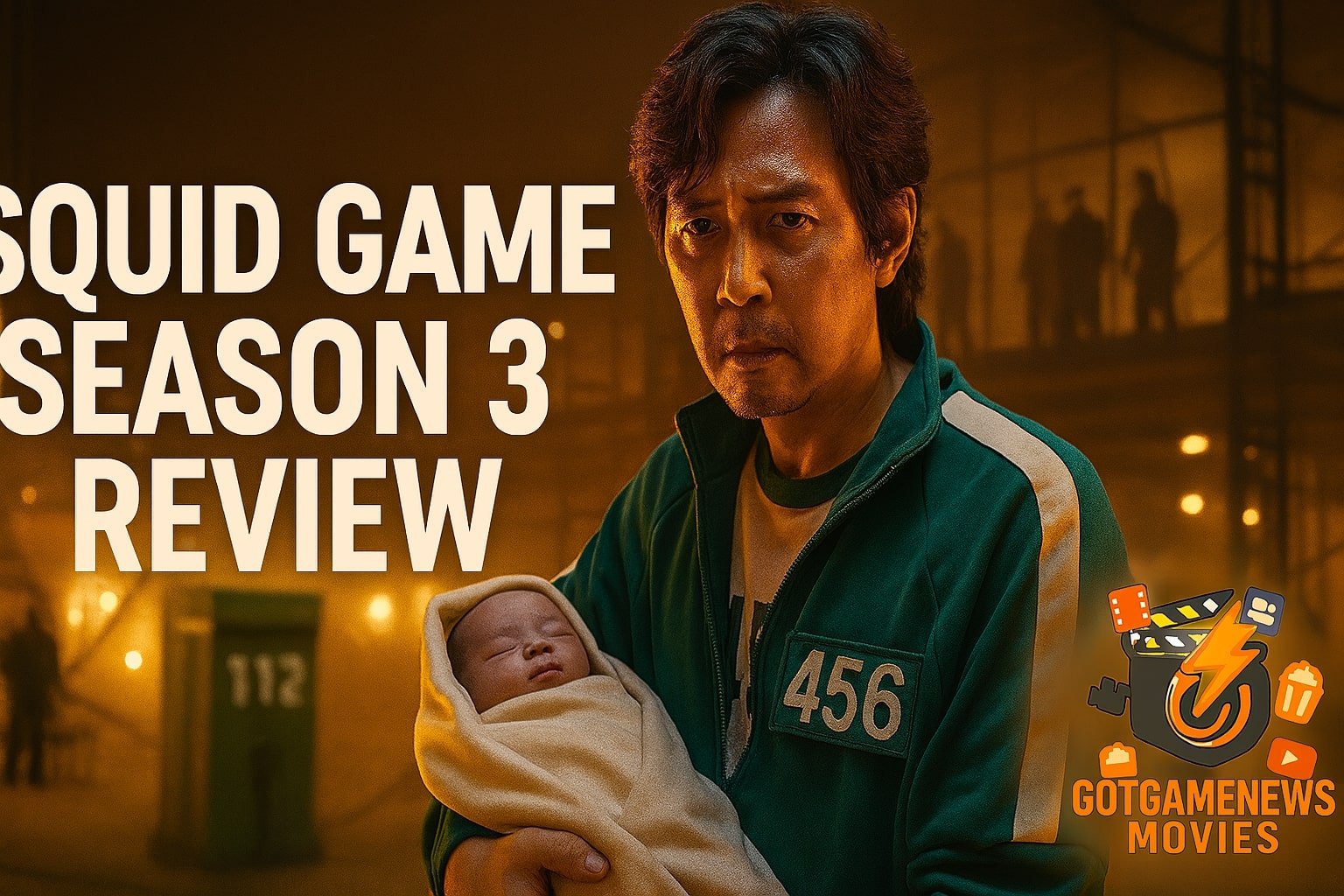🎯 Squid Game Season 3 Expectations – Will Gi-hun Find Redemption?
Coming off the global phenomenon of its first season and the deeper, if more divisive, moral rumination of its second, Squid Game Season 3 had the unenviable task of concluding a saga that began as social allegory and grew into myth. With stakes stretched to global scale, and a fanbase eager for resolution, expectations were a paradox: higher, yet more intimate. Would Gi-hun find redemption? Would the games end, or merely evolve?
The answer is as harrowing as it is poetic. Season 3 doesn’t aim to tie a bow—it sets the whole stage on fire.
- 🌟 Squid Game Season 3 Cast and Performances – Lee Jung-jae and Kim Ji-won Shine
- 🎥 Hwang Dong-hyuk's Direction and Writing in Squid Game Season 3
- 🎨 Squid Game Season 3 Cinematography – A Stark Visual Language of Dread
- 🎭 Squid Game Season 3 Themes – Inheritance, Capitalism, and the Cost of Humanity
- ✅ Squid Game Season 3 Final Verdict – A Tragic Yet Timely Masterpiece
🌟 Squid Game Season 3 Cast and Performances – Lee Jung-jae and Kim Ji-won Shine
Lee Jung-jae delivers perhaps the most haunting performance of his career as Seong Gi-hun. No longer the underdog gambling addict, he’s now a weathered revolutionary—still deeply human, but drained of the naivete that once defined him. His evolution is fully realized in his final choice, which he plays with a soft-spoken fury that devastates.
Lee Byung-hun, returning as the enigmatic Front Man In-ho, is quietly mesmerizing. His scenes with Gi-hun are almost Shakespearean in their gravity, laced with years of trauma and unspoken guilt. And new cast member Kim Ji-won (as Jun-hee) brings a fierce, raw presence as a pregnant contestant whose story forms the emotional fulcrum of the entire season. She’s a revelation.
But it’s the infant—Jun-hee’s child—who becomes the most unlikely and affecting symbol of the show’s moral thesis. She never speaks, yet her presence rewrites the stakes.
🎥 Hwang Dong-hyuk’s Direction and Writing in Squid Game Season 3
Hwang Dong-hyuk’s direction has never been more surgical. He balances a sprawling global narrative with a claustrophobic intimacy, particularly in the season’s final arc. Gone are the bright candy-colored sets of Season 1. Here, the games are stark, almost sterile—void of irony, as if the system no longer needs to mask its cruelty.
The writing leans fully into existential dread. There are moments when dialogue gives way to pure silence, and it’s in these gaps that the series finds its most brutal truths. Hwang doesn’t pull punches—he strips away all illusions. If Season 1 asked whether people would betray for survival, Season 3 asks whether anyone can remain human in a world designed to commodify suffering.
🎨 Squid Game Season 3 Cinematography – A Stark Visual Language of Dread
Visually, Season 3 abandons surreal whimsy for monochrome tension. Cinematographer Lee Mo-gae employs high-contrast lighting and long, static takes that evoke surveillance footage more than cinematic beauty. The games are shot from distant, dispassionate angles—suggesting not just voyeurism but omnipotence. In a brilliant reversal, the camera becomes the most terrifying player.
One sequence—a long, unbroken shot of Gi-hun walking through a room filled with corpses—is a masterclass in visual metaphor. He is both a survivor and a relic, the last man standing in a war no one wins.
🎭 Squid Game Season 3 Themes – Inheritance, Capitalism, and the Cost of Humanity
At its core, Squid Game Season 3 is about the inheritance of pain. It’s not just that the system endures, but that it mutates. The finale dares to imagine a baby winning the game—a newborn inheriting blood money before taking a breath. It’s devastating, absurd, and completely on brand.
The tone is unrelenting. Even the rare moments of levity feel like nervous laughter at a funeral. Yet there’s an undercurrent of defiance that builds toward Gi-hun’s final act: a literal leap of faith that reclaims agency, even in death. It’s a narrative middle finger to the VIPs—and, by extension, to any system that turns people into pawns.
The global sprawl of the epilogue—especially the Cate Blanchett cameo as a recruiter in Los Angeles—extends the show’s thesis: the game was never Korean. It was always capitalist. Now it’s just franchised.
✅ Squid Game Season 3 Final Verdict – A Tragic Yet Timely Masterpiece
Squid Game Season 3 is not interested in happy endings. It offers something rarer: moral clarity. In a finale that sees beloved characters die, a newborn win, and the system morph rather than crumble, Hwang Dong-hyuk refuses to soothe us. But he does something better. He dares us to feel.
It’s not an easy watch. But it’s essential. For all its bleakness, Squid Game‘s conclusion is a masterstroke—not because it shocks, but because it mourns. It grieves the world it depicts. And it leaves behind a question that lingers far longer than any twist: What would you die for, and who are you really saving?





